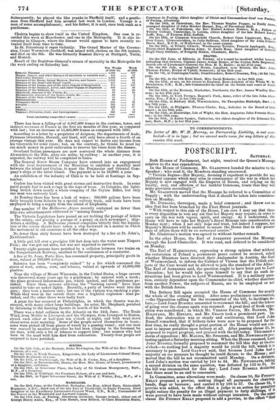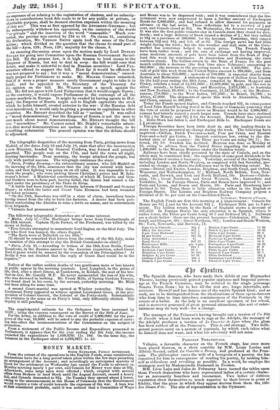POSTSCRIPT.
SATURDAY.
Both Houses of Parliament, last night, received the Queen's Message relative to the war expenditure.
In the House of Commons, Mr. Gxenseurin handed the missive to the Speaker ; who read it, the Members standing uncovered. Victoria Regina—Her Majesty, deeming it expedient to provide for any additional expense which may arise in consequence of the war in which her Majesty is now engaged with the Emperor of Russia, and relying on the loyalty, zeal, and affection of her faithful Commons, trusts that they will make provision accordingly."
Mr. GLADSTONE moved that the Message be referred to a Committee of Supply ; with the understanding that it should be taken into considera- tion on Monday. Mr. DISRAELI, thereupon, made a brief comment ; and threw out an idea that has been broached by the Fleet Street journals. "With respect to this side of the House, I am sure I may say that there is every disposition to vote any aid that her Majesty may require, in order to carry on the war with vigour, spirit, and energy. As I understand, the House will have to take her Majesty's Royal Message into consideration OD Monday next when I not only hope and trust, but indeed I suppose, her Majesty's Ministers will be enabled to assure the House that in the present state of affairs there will be an autumnal session."
Mr. Gladstone's motion was agreed to without further remark.
In the other House, the Earl of ABERDEEN presented the Message through the Lord Chancellor. It was read, and ordered to be considered on Monday.
The Earl of HeanceetTow, expressing a strong opinion that without the restoration of Poland a permanent peace cannot be secured, asked whether Ministers have directed their Ambassador in Austria, the Earl of Westmoreland, to inform the Cabinet of Vienna that the Polish sub- jects of the Czar would not be allowed to join the standard of the Allies: The Earl of ABERDEEN said, the question ought to have been put to Lord Clarendon ; but he would take upon himself to say that no such in- structions had been given to Lord Westmoreland. It is a military ques- tion, entirely dependent upon the Commander-in-chief, whether deserters from another Power, the subjects of Russia, are to be employed or not with the British forces.
The Bribery Bill again occupied the House of Commons for nearly the whole of the evening sitting. After some preliminary conversation, —the Opposition calling for the recommittal of the bill, to facilitate de- bate,—Lord Joan' Eugenia. consented to recommit the bill; and the labour of going over the clauses again was resumed. A great deal of fresh oppo- sition was manifested ; in which Mr. VERNON Salim, Mr. Bermes, Mr. HILMAR; Mr. HENLEY, and Mr. GEACH took a prominent rout. In- deed, the obstruction was so steady and continuous, that Lord John Russell remarked, that if bribery-laws were now to be proposed foe the first time, he really thought a great portion of the House would not con- sent to impose penalties upon bribery at all. After passing clause 31, he proposed to report progress, and proceed with the bill today. This raised a storm of opposition; MT. MALINS, Mr. SPOONER, and MT. NBWDEGATE pre- testing against a Saturday morning sitting. When the House resumed, Lord Jelin RI:Isms, formally proposed to recommit the bill this day at twelve o'clock—to nothing but a majority would he yield the bill, which it is necessary to pass. Lord GALWAY said, that because Lord John had a majority on one measure he thought he could dictate to the House ; and moved that the bill be net recommitted until Monday. On a division, Lord John's motion was carried by 144 to 64. Mr. NEWDEGIATE, taking a second division on the same question, was defeated by 132 to 51. So the bill was recommitted for this day ; Lord Joust RUSSELL declaring that there must be an end to concession. In Committee, some alterations were made. On clause 10, Sir FrrzneY KELLY proposed a proviso, making illegal all payments for chairing) bands, flags or banners; and carried it by 106 to 57. On clause 24, a proviso was added, to the effect that a judge in an action for penalties might reduce the penalty for an illegal payment to forty shillings, if it were proved to have been made without corrupt intention. On the Italue clause Sir FITZROY KELLY proposed to add a proviso, to the effect "that no expenses of or relating to the registration of electors, and no subscrip- tions or contributions bona fide made to or for any public or private, or charitable purpose, shall be deemed election expenses within the meaning of this act." This was at first opposed by the Arronsnly-Gesintst, ; but be subsequently withdrew his opposition, on the omission of the words "or private" and the insertion of the word "reasonable." Much con- tested, the proviso was carried by 234 to 16. On clause 31, containing the declaration, Mr. VERNON Burnt again took the sense of the Com- mittee; which divided on the question that the clause do stand part of the bill—Ayes, 128; Noes, 120; majority for the clause, 8.
An amusing discussion arose upon the motion made by Lord DUDLEY severe for going into Committee upon the Russian Government Securi- ties Bill. By the present law, it is high treason to lend money to the Emperor of Russia, but not to deal in scrip: the bill would oure that defect, and make it unlawful to deal in Russian securities ? Lord Pax- *anneal offered to support the bill. Plow far it would be efficient he was not prepared to say ; but it was a "moral demonstration," exceed- ingly proper for Parliament to make. Mr. MILNER GIBSON remarked, that if it were a proper measure surely Government ought to take it in hand; and he appealed to the Secretary of the Treasury for his opinion on the bill. Mr. WiLsost made a speech against the bill. He did not agree with Lord Palmerston that it would cripple Russia ; on the contrary, it would expose Parliament to the contempt of all the money-markets in Europe. It might be evaded by having agents in Hol- land; the Emperor of Russia might sell to English capitalists the stock which he holds himself, created anterior to the war : if the Russian debt were interdicted, it would only be giving a premium to capitalists in other countries. Mr. BRIGHT described the bill as "useless," It was called a "moral demonstration," but the Emperor of Russia is not the man to care much about moral demonstrations. Mr. HPNLEY thought the bill was "moonshine." Mr. CAIRNS noted Mr. Bright's remarkable admis- sion that moral demonstrations are useless : it is time, therefore, to do something substantial. The general opinion was that the debate should be adjourned.



























 Previous page
Previous page